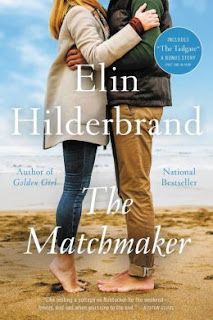The book I was reading was called The Matchmaker. It's about a woman who lives on Nantucket. She works for the Chamber of Commerce and has a complicated personal life. She also has the gift of being able to match people and launch them into successful long-term relationships. The book is filled with colorful characters and is an easy read. I picked it up and put it down several times over the past couple of weeks, reading snatches whenever I had time. Although I never wanted to put it down, I couldn't sit and read all day, there were other tasks at hand.
When I reached the last chapter of the book, I was filled with sadness. The main character is dying of cancer. As the author describes her pain and the way her diagnosis affects her relationships, I couldn't help but weep. The story was too close to my own.
I found myself reliving emotions I'd faced 8 years ago, during my own cancer diagnosis. It didn't feel good to go down that path again and I wondered, when I'd ever be completely set free from the hold cancer had over me.
In the author's notes, at the end of the book, I discovered she'd been diagnosed with breast cancer a month before the publication of her book, The Matchmaker. She'd opted to have a double mastectomy, just like me. Her notes explained she rarely based her writings on real life events, but in this particular book, she'd given the main character a cancer diagnosis before learning about her own. Of course, the character's cancer was pancreatic while the author's was breast, but cancer is cancer.
I was surprised to learn of the author's diagnosis and surgery. When I read about it, I couldn't help but think, almost every woman I've ever known or read about has had either a personal experience with cancer or has been touched by it through the life of someone they've loved. It made me angry.
I searched the internet for information on the author. I wanted to find out if she was still living. The book had been released in 2014, so that meant Ms. Hilderbrand and I had been diagnosed the same year. I was relieved to find out she's still alive and plans to stop writing in 2024.
In one of her YouTube interviews, Ms. Hilderbrand says, "I would take the cancer again - and why? Because it is only in facing that which threatens your very being that you learn what it means to be alive." That statement gave me pause. Taking a few minutes to reflect, I had to agree with her. I felt the same way. Until I was diagnosed with cancer, I took life for granted. Oh, I didn't mean to, but I did. I just assumed I'd wake up each morning. I assumed, I'd get out of bed and do whatever I wanted. I assumed, I'd live to a ripe old age and then when cancer disrupted my life, I was slapped with the reality that no one is promised tomorrow.
It's sad to think it takes a health crisis to wake one up, isn't it? But more often than not, that's exactly what happens and many times, by the time we get the message, too much time has slipped under the bridge.
One thing cancer has taught me is that life is a precious gift, one not to be squandered. I can honestly say I'm thankful it's taught me that. Now I cherish every moment and plan to keep on doing that until the day I die.




No comments:
Post a Comment